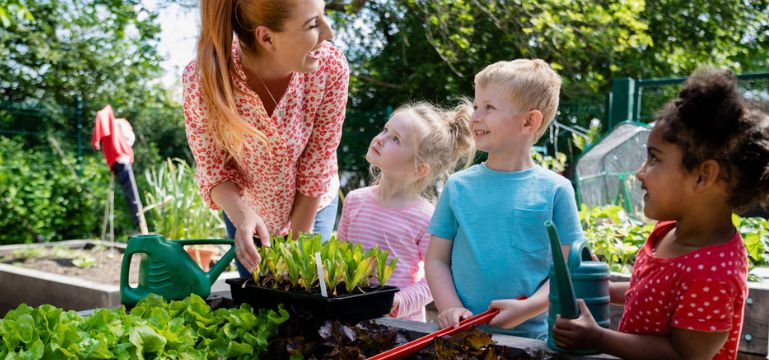The impact of strong partnerships.

Quick links:
Information about the setting
Chuckles is a private full day care Nursery in Bettws, Newport, catering for 70 children between six weeks and four years of age.
Context and background to the effective or innovative practice
Bettws sits fairly high on the index of Multiple Deprivation List and, although not all the children come from this area, previous roles the RI held in the community had highlighted the need for helping to support parents raising children. The extended family was slowly disappearing, so the setting needed to become part of that.
Description of nature of strategy or activity
A Nursery needs to build a family consisting of staff, parents, children and the wider community.
What impact has this work had on provision and children’s standards?
The head of the ‘family’ is a focused management team, who understand what is needed to achieve the values the setting wants to instill into everyone. Practitioners place great emphasis on developing a highly skilled team of practitioners. Where possible, they try to book mandatory training during normal working hours. Where this is not possible, practitioners pay additional hours to staff for attending training. It can be difficult but they try to ensure that there is a representative of the Nursery at all training so it can be fed back to the rest of the team. Practitioners endeavour to support the team if they wish to attend appropriate additional professional learning, for example when attending training on learning elements of sign language. Team building is an essential element in supporting staff to work together. Practitioners place great emphasis on supporting and nurturing their staff. For example, they have monthly ‘cake days,’ weekly dance classes paid for by the Nursery and an on-site gym, which supports staff health and well-being. All staff can eat daily from the Nursery menu for a cost of only £1. The setting provides a range of social occasions for staff throughout the year. These occasions are not necessarily grand events, but activities such as a barbeque in the garden, which foster a strong team ethos successfully.
A happy, skilled team leads to confidence when planning activities that develop children’s skills successfully. Children are taught about the importance of fostering community through developing strong relationships with practitioners. Practitioners arrange for the children to visit local libraries and the local retirement home to spend time with the elderly. Children love attending and bring joy to the residents as they participate in activities together.
The setting changed the hours of apprentices to 25 hours, with five of those hours being on-site study. It was challenging for apprentices to work full time and also complete the required study in their own time. They now complete their studies during their working hours. Assessors support them as a group and this has helped ensure that different assignments are completed on time.
Regular parent workshops started with fun craft activities at Christmas and Easter. Practitioners used the EYPDG grant to run cooking classes for parents and copied the menus used at Nursery for them to use at home, promoting healthy eating habits. The setting now runs parent workshops incorporating elements such as sport, woodwork and gardening. As the parents have become more confident, practitioners have introduced them to the range of different activities that are provided for the children at Nursery.
The setting also has the Family app, which was introduced during the pandemic. This app means that parents can message the individual member of staff caring for their child during the day and the team can share photos safely with them.
Practitioners feel that arrangements for transition are very important. They need to ensure that they have as much information as possible so that they really get to know the child who is coming to spend time at the setting. Practitioners also provide as much information as possible to settings or schools when the children are moving on. They work with outside agencies to ensure that children with ALN receive the help they require. At the end of each school year, practitioners arrange activities with the local schools so that the children get used to their new environment and build confidence through visiting with people who are familiar to them.
Partnership working creates an environment where the child is at the centre of everything that the setting does. The team are confident, relaxed and happy, and this has a very positive impact on the children. Developing a strong relationship between practitioners and parents builds mutual respect and trust.